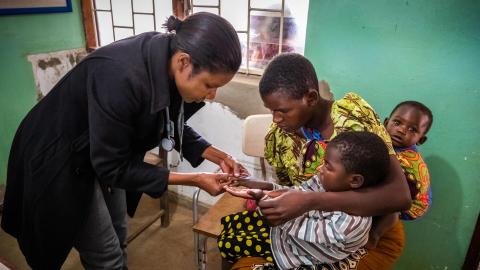
Health and Nutrition
Keeping children healthy and nourished
We envision communities where mothers and children have improved health across Malawi.
What is the problem?
Across Malawi, 37% of the children are stunted (low height for age) while 12% are underweight, according to the 2015-16 Malawi Demographic & Health Survey. Our work and other studies have established that inadequate dietary intake, poor feeding practices (which come because of knowledge deficit in diversified and preparation of nutritious meals) and other factors lead to children’s vulnerability to infections.
Other health challenges that communities face include:
- 24% of hospital admissions are due to malaria
- 8.8% of Malawians are HIV positive
- Under 5 mortality is at 63 per every 1,000 live births
- 78% of children under five experience acute respiratory infection
What is World Vision doing?
Through the Maternal and Child Health (MCH) Technical Programme, World Vision is working with the government, communities and other stakeholders to ensure that mothers and under five children are protected from infections and diseases.
The programme is building capacity of communities to prevent and manage infectious diseases (Malaria, Diarrhoea, ARI and HIV/AIDS). In addition, the programme is also enhancing appropriate feeding practices among pregnant women, mothers and children, for improved health and well-being.
What is the impact?
- Although there is more work to be done, the impact of World Vision’s work can be seen in the 2.7% reduction of stunting (caused by chronic malnutrition) in children under age five in the areas where we are working (from 37.7% in 2016 to 35% in 2021).
- 1.8 million Children aged between six and 59 months received Vitamin A supplementation during the 2020 Child Health Days campaign. In addition, 1.5 million children (12-59 months) also received Albendazole for deworming.
- Safeguarded nearly 2 million people, including 201,931 children and 23,766 pregnant women, from malaria through an Indoor Residual Spray (IRS) project in Mangochi, Nkhata Bay, and Balaka districts.
- Through home visits, 117,777 people, including mothers and pregnant women, were reached with nutrition as well as malaria prevention and management messages.
- With support from the Global Fund, World Vision reached out to 109,673 in and out of school youths with Sexual and Reproductive Health education in Mangochi.
Related resources:
- Malawi Nutrition Policy: Click here to download the policy, or here to read a related article.
- Millions safe from malaria thanks to indoor residual spray project
- National Statistics Office health updates